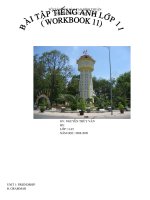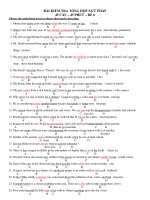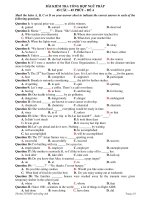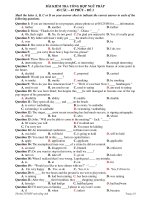Tong hop ngu phap 11 - ki 1 - cuc hay
Bạn đang xem bản rút gọn của tài liệu. Xem và tải ngay bản đầy đủ của tài liệu tại đây (175.4 KB, 6 trang )
Revision for the first term : Grade 11
(Test specifications )
I. Grammar :
+ Tenses : - present simple expressing past time .
- past simple , past progressive and past perfect .
+ Infinitives : - to-infinitive ( V-to) , passive infinitive ___V-to và bị động của V-to)
- bare-infinitive ( Vo ) ____Vo ( nguyên thể không to )
+ Gerund - gerund ( Ving ) ___ (Danh động từ )
- perfect gerund ( having + V2 ) ____Danh động từ hoàn thành
- passive gerund ( being + V2 ) ____ Dạng bị động của danh động từ
+ Participle - present participle ( Ving) ______ (Hiện tại phân từ)
- perfect participle ( having + V2 ) __Phân từ hoàn thành
+ Reported speech reported speech with Vto ___ Câu tờng thuật sử dụng Vto
reported speech with Ving ___ Câu tờng thuật sử dụng V-ing
+Conditional sentence conditional type 1 , 2 , 3 ( revision )
conditional in reported speech __Câu điều kiện trong tờng thuật
II. Pronunciation
Sounds ( consonants )
III. Vocabulary topics : - friendship
& Reading topics - personal experiences , physical characteristics
- party
- word formation : volunteer work and illiteracy
- competitions and celebrations
- population
IV. Writing - writing a personal letter
- letter of invitation
- a formal letter expressing gratitude
- a letter of reply
- describing information from charts/ tables
- describing a celebrations activities
Grammar explanations
I. TENSES
Past Progressive and Past Perfect
Trong một câu , nếu có 2 hành động ở quá khứ thì thờng có sự phối hợp về thì nh sau :
1. Past simple + past progressive ( quá khứ đơn + quá khứ tiếp diễn ) :
- cách dùng : Diễn tả 1 hành động đang xảy ra thì 1 hành động khác xen vào -> quan hệ cắt nhau
( hành động đang xảy ra : dùng Past simple
hành động xen vào : dùng Past progressive )
Eg : When we were having dinner , he came .
2. Past simple + past perfect ( quá khứ đơn + quá khứ hoàn thành )
- cách dùng : Diễn tả 2 hành động xảy ra nối tiếp nhau trong quá khứ -> quan hệ trớc sau
( hành động xảy ra trớc : dùng Past perfect
hành động xảy ra sau : dùng Past simple )
Eg : After he had done all his homework , he went to bed .
Created by Nguyễn Văn Toàn Dr of Yen The High Shool
II . FORMS OF VERBS
Example
3 basic forms of verbs : The infinitive to - infinitive ( Vto ) to go
bare - infinitive ( Vo ) go
The gerund ( V-ing ) going
The participle present participle ( V-ing ) interesting
past participle ( V-ed ) interested
1 . Cách dùng của To-infinitive ( uses of Vto )
- Chủ ngữ : To behave like that is stupid .
- Bổ ngữ : His great dream is to become a famous singer .
- Đợc dùng để diễn tả mục đích ( trả lời cho Why .? ) :
Eg : Im learning English to get a good job
I saved money to buy a new bike .
- Đợc dùng sau các từ để hỏi nh : Who , what , where , how .
Eg : Can you tell me how to get to the station ?
Show me what to do .
- Đợc dùng sau các từ chỉ tập hợp : something , some .., much , nothing , nowhere , anybody .
Eg : Have something to eat
Some shopping to do
Ive got nothing to do .
- Dùng sau các tính từ nh :
interesting , interested, boring , happy , surprised , sorry , pleased, delighted , hard ,
difficult , easy , dangerous , impossible , wonderful , lovely , important , .
Eg : Im very delighted to hear the news .
Its dangerous to go out at night alone .
- Đợc dùng sau một số động từ nh : ()
V = want , agree , refuse , seem , decide , ask , tend , promise , manage , expect , offer
try , hope , choose , need , help , plan , pretend , threaten , attempt , arrange , fail ,
appear , prefer , would like .
Eg : I want to get a good job
She refused to go out with us
- Đợc dùng trong cấu trúc :
(V = invite , tell , want , order , teach , force ,beg, warn , help , persuade , get , enable ,
allow , encourage , permit , wish , instruct ..)
2. Cách dùng của Bare infinitive ( uses of Vo )
- Dùng sau trợ động từ , động từ khuyết thiếu :
(V = will , can , must , should , would rather , had better , )
- Dùng trong cấu trúc :
(V = Make , let
Feel , hear , see , watch , smell ( động từ cảm quan ) )
Eg : Nothing can make him cry
I saw him get into the car
V + O + Vto
V + Vo
V + O + Vo
V + Vto
Created by Nguyễn Văn Toàn Dr of Yen The High Shool
3 . Cách dùng của Danh động từ ( uses of Gerund )
- Chủ ngữ ( Subject ) :
Eg : Swimming is my favourite sport .
- Bổ ngữ ( complement ) :
Eg : My hobby is watching football .
- Tân ngữ ( object ) :
+ Tân ngữ trực tiếp cho một số động từ : like , love , enjoy, hate, dislike , avoid , mind ,
( đứng sau một số động từ ) finish , begin , continue (keep), deny , practice ,
suggest ,admit , regret , consider , delay , risk
appreciate ,miss , forgive , insist , quit , postpone ,
report , ..
Eg : I enjoy reading detective story
+ Đứng sau 1 số cụm động từ và thành ngữ : give up , keep on , look forward to , care for ,
cant bear , cant stand , cant help , feel like
its no use , its worth , its no good , be busy
Eg : Im busy doing my homework
+ Tân ngữ cho giới từ hoặc tính từ + giới từ : interested in , keen on , bored with , surprised at
( đứng sau giới từ ) ,proud of , tired of , worried about , good at ,
afraid of ,amused at , exited about , aware of ..
Eg : Hes bored with doing the same thing everyday .
4 . Cách dùng của Phân từ
4.1 . Hiện tại phân từ : Present participle : V-ing :
- Làm động từ (Thành lập nên các thì tiếp diễn ) :
Eg : He is working at the moment .
- Làm tính từ :
Eg : Its an interesting play .
- Dùng trong mệnh đề tỉnh lợc ( nối 2 câu có cùng chủ ngữ hoặc các hành động nối tiếp nhau ) :
Eg : + I enjoy playing games . I often sit in front of my computer in my free time .
-> Enjoying playing games , I often sit in front of my computer in my free time .
+ He finished his homework . He went to bed .
-> Finishing his homework , he went to bed .
- Dùng thay cho Đại từ quan hệ + động từ :
Eg : The man who visited you yesterday is my friend .
-> The man visiting you yesterday is my friend .
- Dùng trong cấu trúc :
( V = see , watch , feel , hear , smell ( động từ cảm quan ) )
Eg : When I visited him yesterday , I saw him sleeping .
- Dùng trong cấu trúc :
Eg : I often spend 2 hours doing my homework .
4.2 . Quá khứ phân từ : past participle : V-ed
- Kết hợp với be để thành lập nên các thể bị động : A new school will be built here .
- Kết hợp với to have để thành lập các thì hoàn thành : I have been lived here for 10 years
- Đợc dùng để nối 2 câu có cùng chủ ngữ ( nghĩa bị động )
Created by Nguyễn Văn Toàn Dr of Yen The High Shool
V + V-ing
V + O + V-ing
spend / waste + time / money + V-ing
III. Passive infinitive and passive gerund
( Dạng bị động của V-to và V-ing )
V-to và V-ing mang nghĩa chủ động . Passive infinitive và passive gerund có cách dùng giống nh V-to
và V-ing nhng mang nghĩa bị động :
1. Passive infinitive :
Eg : I expected to invite him to the party > < I expected to be invited to the party by David .
( Tôi mong đợi mời anh ấy đến bữa tiệc ) ( Tôi mong đợc mời đến bữa tiệc bởi David )
2. Passive gerund :
Eg : Trang enjoys phoning Nam > < Trang enjoys being phoned by Nam
( Trang thích gọi cho Nam ) ( Trang thích đợc Nam gọi đến )
IV. Perfect Gerund and Perfect Participle
( Danh động từ hoàn thành và phân từ hoàn thành )
Perfect Gerund and Perfect Participle cũng có cách dùng giống nh Gerund và Present Participle .
Về mặt ý nghĩa , khi ta muốn nhấn mạnh đến tính đã hoàn tất của 1 hành động trớc hành động khác thì ta
dùng Perfect Gerund and Perfect Participle .
- Cấu tạo : cả 2 đều có cấu tạo
- Ví dụ minh hoạ :
+ Perfect Gerund :
I finished my housework , then I watched TV = Finishing my housework , I watched TV .
( làm công việc nhà sau đó xem tivi )
After I had finished my housework , I watched TV = Having finished my housework , I watched TV.
( Chỉ xem tivi sau khi đã làm xong việc nhà )
+ Perfect Participle :
She is afraid of seeing ghosts ( cô áy sợ ma )
She is afraid of having seen ghosts . ( cô ấy sợ vì đã nhìn thấy ma )
V. Reported Speech with V-to and V-ing
(Câu tờng thuật sử dụng Vto và V-ing )
1 . Reported Speech with V-to
Trong câu tờng thuật sử dụng V-to ta dùng 2 cấu trúc cơ bản sau :
- Để tờng thuật mệnh lệnh , yêu cầu , lời khuyên , lời mời ta dùng cấu trúc :
( Vt.th = tell , ask , remind , advise , invite , encourage , warn )
Eg : Turn off the TV and go to bed , my mother said to me .
-> My mother told me to turn off the TV and go to bed .
- Để tờng thuật đề nghị giúp đỡ , lời hứa .. ta dùng cấu trúc :
( Vt.th = promise , offer , refuse , agree )
+ to be + V2
to be being + V2
to be Having + V2
to be S + Vt.th + O + Vto
to be S + Vt.th + Vto
Eg : Ill not make noise in class again ! , the boy said to the teacher .
-> The boy promised not to make noise in class again .
2. Reported Speech with V-ing
Trong câu tòng thuật sử dụng V-ing ta dùng 3 cấu trúc cơ bản sau :
( ( Vt.th = suggest , deny , admit )
( Vt.th + P = apologize for , insist on , dream of , think of )
( Vt.th + . + P = accuse___of , prevent ( stop )___from ,
warn___ against , congratulate___on , thank__ for )
* Chú ý : dạng phủ định thêm not vào trớc Vto hoặc Ving
VI. Conditional sentences
1. Type of conditional sentences ( Phân loại câu điều kiện )
Form ( cấu tạo )
If clause Main clause
Uses Example
Type 1
If + S + V( ht đơn ) S + will /shall + Vo
- Chỉ một khả năng có
thể xảy ra ở hện tại hoặc
tơng lai ( nếu 1 hành
động này xảy ra thì hđ
khác sẽ xảy ra )
If you study hard ,
you will pass your
exam .
Type 2
If + S + V(qk đơn ) S + would + Vo
could
- Chỉ 1 khả năng , điều
kiện không có thật ở hiện
tại ( 1 mơ ớc ở hiện tại )
If I had 5 billion
dollars , I would
travel around the
world
Type 3
If + S + had + V2 S + would have +
V2
could
- Chỉ 1 khả năng, điều
kiện không có thật ở quá
khứ ( 1 mơ ớc , sự hối
tiếc ở quá khứ )
- If I had had a
map, I wouldn t
have lost my way .
- If I had studied
hard , I would have
passed my exam .
* Một số lu ý về câu điều kiện :
- Type 1 ( loại 1 )
+ Ngoài Will/ Shall ta có thể dùng Can / May/ Must trong mệnh đề chính
+ Ngoài cách dùng trên , câu điều kiện loại 1 còn đợc dùng để diễn tả 1 thói quen .
Trong trờng hợp này động từ trong mệnh đế chính cũng chia ở hiện tại đơn
If + S + V( ht đơn ) , S + V(ht đơn )
Eg : If Peter are free at the weekend , he visits his grandparents
be S + Vt.th + Ving
S + Vt.th + P + V-ing
S + Vt.th + O + P + V-ing









